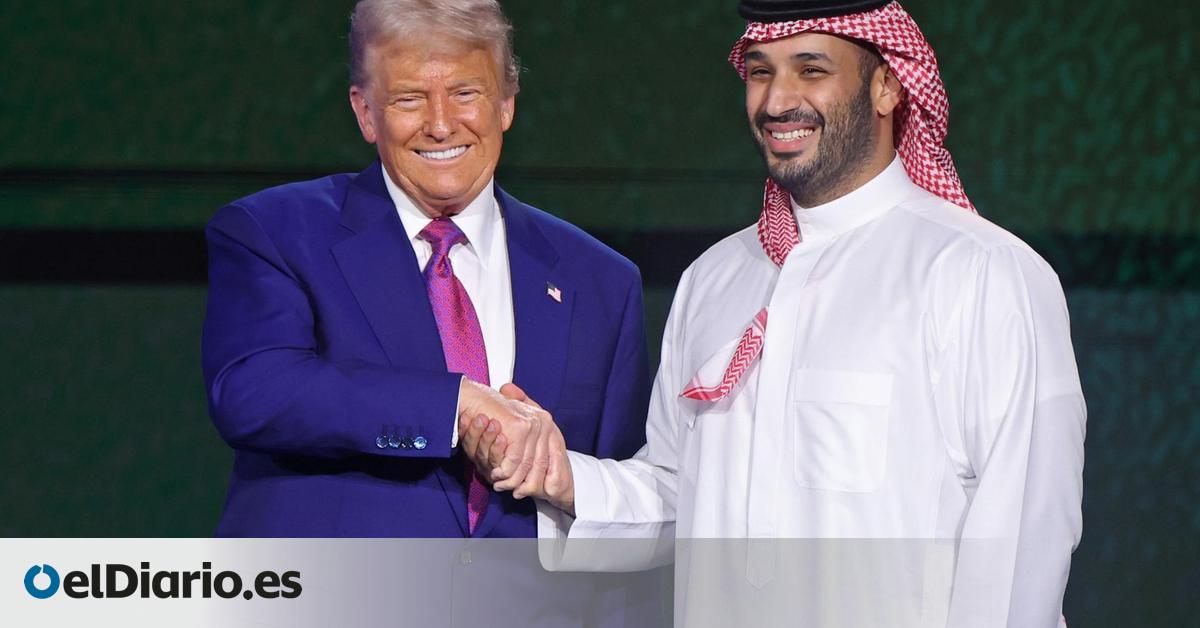
The latest actions of the US Administration with the Hutis, Iran, Syria or Turkey reveal how the new map designed by Donald Trump could be for the Middle East: direct negotiations with the actors that are useful – they are terrorist organizations or not -, priority for the interests of the United States and less prominence for the Israel of Benjamín Netanyahu, which has passed from the main actor to secondary actor to secondary actor and sometimes even figurant.
This follows from the program of President Trump’s first major trip who, accompanied by a large group of US businessmen and managers, began on Tuesday in Saudi Arabia, where the Republican has signed with the prime minister and heir prince, Mohamed Bin Salmán, a strategic economic association agreement that includes Riyad’s commitment to invest almost 142,000 million dollars in material. USA
In addition, Trump will also travel to Qatar on Wednesday and finish his journey in the United Arab Emirates (EAU), where the heading of the announcement is scheduled that the sheikh Mohamed Bin Zayed al Nahyan already did this year: the investment of 1.4 billion dollars in semiconductors, manufacturing and energy with the development of artificial intelligence as a new strategic area of interest for the country Persian Gulf.
On this occasion, Netanyahu is not invited to greet Trump in the usual stop of any US president at Tel Aviv airport or for the meetings planned in Qatar, where the Republican will seek a new agreement between Israel and Hamas on Gaza.
“Trump is telling Netanyahu: ‘Honey, I already fed up with you,” said commentator Dana Fahn Luzon during a recent television debate in Israel on the high -fire agreement over the fire reached directly between US president and Yemen’s hutis. “Trump does not go to Israel because he does not see any advantage in going there and does not want to be dragged into the ‘mess’ of Netanyahu in Gaza,” says Michael Koplow, policy director of the Israel Policy Forum.
The exclusion of Netanyahu from the movements and contacts of the Trump administration in the Middle East was evident on Monday, just one day before the arrival of the US leader to the region. Thanks to an agreement between the US and Hamas, with the mediation of Qatar, the Palestinian group released the Israeli-American hostage Edan Alexander as a “gesture of goodwill towards President Trump”, as described by his special envoy for the Middle East, Steve Witkoff, the main architect of the agreement.
Apparently, the Netanyahu government was not informed by its American partner, but knew the agreement through its own intelligence and this has bothered some members of the government and opposition. In addition, the Haaretz newspaper said Tuesday what has been Trump’s envoy, Steve Witkoff, who has demanded Netanyahu to send a delegation to Qatar to negotiate the end of the war.
“We have worked tirelessly to recover all Hamás hostages. We have already recovered many, but we are recovering more. This weekend we have negotiated the release of the last American hostage, Edan Alexander, and we continue working to put an end to that war as soon as possible,” Trump said in his first stop in Saudi Arabia.
Trump’s desire: an Israel-Saudi agreement agreement
The humanitarian crisis in Gaza – where famine levels have increased due to Israel’s absolute blockade over the strip for more than two months – and Netanyahu’s personal effort to continue with his war against Hamas, which still retains 58 hostages (it is believed that about twenty is still alive), he has dynamited the long -awaited normalization of diplomatic relations between Israel and Arabia Saudi Trump from the signing of Abraham’s agreements in 2020, but also President Joe Biden shortly before the Hamas attack of October 7, 2023.
“This Israeli government is not our ally,” wrote American analyst Thomas Friedman in his last column in The New York Times. “Netanyahu put their personal interests ahead of those of Israel and the United States, condemning the failure (between Israel and Saudi Arabia) that the entire Muslim world had opened to Israeli tourists and investors (…). After Netanyahu has been manipulating the whole world for two years, both the Americans and the Saudis have decided to renounce their participation in the agreement,” The columnist.
The Obcecation of Netanyahu for continuing to sweep Gaza under the pretext of ending Hamas at any price – including the lives of more than 17,000 boys and girls, according to data from the United Nations High Commissioner Office for Human Rights – the possibility of a normalization agreement between the once enemies has hurt. However, Trump does not lose hope of completing his dream.
“Abraham’s agreements have been somewhat amazing and I have the fervent hope, desire and even dream that Saudi Arabia […] You soon join Abraham’s agreements. I think it will be a great tribute to his country and something really important for the future of the Middle East, ”Trump said Tuesday in Riyadh.
According to an official American source and two of the Gulf cited by the Reuters news agency, US officials press Israel to accept a high immediate fire in Gaza, one of the previous conditions of Saudi Arabia to re -establish conversations about the normalization of relations with Tel Aviv. Two of the sources point out that Netanyahu’s opposition to stop the war or the creation of a Palestinian State makes the progress in those conversations with Riadad unlikely.
To achieve its objectives, Trump needs the leaders of the Arab states that will entertain him with the most ostentatious gifts (Qatar has offered him a presidential plane worth more 360 million euros), but they will require some compensation that allows them Israel in its destructive Gaza campaign comes from the same country with which its rulers are now willing to sign succulent commercial and economic agreements.
Finally, the Iranian uranium enrichment program is also on the table during Trump’s trip, but for Netanyahu’s disgust his cabinet also does not have details about the issue that obsess the most. “Neither of this, nor what will do in most of the trip we have a lot of information,” said one of his advisors to Israeli newspaper Haaretz.
Iran and the headache for Netyahu
If Donald Trump was able to announce in the Oval Office and during Netanyahu’s visit to Washington on April 7 that his country was maintaining direct conversations with Iran, the black beast of Israel, without having previously informed his friend Bibi of the details, the first minister’s cabinet awaits any outcome.
According to local media, Iranian and American diplomats have been working for days in a memorandum of understanding between the US and Iran, which celebrated the fourth round of bilateral negotiations last Sunday in Mascate, capital of Oman, the mediating country. “The conversations were difficult, but useful,” said Iranian Foreign Ministry spokesman, Esmail Baghaei. Meanwhile, an American official who spoke anonymity at the end of the meeting said they were “encouraged by the result” of the consultations.
Trump has warned Tehran on Tuesday of the consequences of not achieving an understanding: “I want to reach an agreement with Iran. If I achieve it, I will be very happy because we will make their region and the world a safer place. But if Iranian leaders reject this olive branch and continue to attack their neighbors, we will have no choice but to exert a maximum mass pressure and reduce the export exports of ib. as I did before. ”
Trump wants to achieve a “better agreement” than the sealing by Barack Obama in 2015 (known as the JcPoa Comprehensive Action Plan). Iran, after the death of the JCPOA for the US departure ordered by Trump himself, is today capable of enriching uranium not at 20% purity, as was the case in 2015, but more than 60%, according to estimates of the International Atomic Energy Agency (OIEA).
Meanwhile, Netanyahu, who has been dreaming of decades with a large -scale military attack against Iran’s nuclear facilities, remains awaiting when the two months that Trump gave Iran to reach a new nuclear agreement under the warning of possible military actions in case of not participating and making advances in negotiations were completed on Monday.
“We really want them to be a prosperous country. We want them to be a wonderful, safe and great country. But they cannot have a nuclear weapon,” Trump said Tuesday. “This is an offer that will not last forever. It is now the time they choose.”
During his tour of the Middle East, Trump wants to enhance his negotiating image, of a peace man and facilitator of difficult agreements, in addition to supporting a new vision of the region, away from the traditional struggles for power and violence. “In other cities of the Peninsula, such as Dubai, Abu Dabi, Doha and Mascate, the transformations have been incredibly notable before our eyes,” he said in one of those cities, Riad.
“A new generation of leaders is overcoming the ancient conflicts and the worn divisions of the past, forging a future where the Middle East is defined by trade, not by chaos, for terrorism; and where people from different nations, religions and creeds build cities together, not annihilating each other.”
Trump wants to enhance his negotiating image and present himself as a man of peace and facilitator of difficult agreements. Ancient collaborators such as John R. Bolton, National Security Exase, say that what really craves is to win the Nobel Peace Prize. “I deserve it, but they will never give it to me,” he said the last time he mentioned this issue before the media being in the Oval Office and next to his “Bibi friend,” Bibi Netanyahu, the same one who is accused of war crimes and crimes against humanity by the International Criminal Court (CPI).
Source: www.eldiario.es

